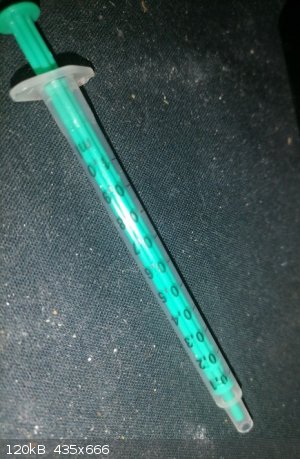Yttrium2
Perpetual Question Machine
    
Posts: 1104
Registered: 7-2-2015
Member Is Offline
|
|
Best way to measure a milliliter?
What is it?
|
|
|
j_sum1
Administrator
       
Posts: 6320
Registered: 4-10-2014
Location: At home
Member Is Online
Mood: Most of the ducks are in a row
|
|
A micropipette. Biologists do it all the time.
Using what I have in my lab -- a Pasteur pipette, a lot of time calibrating it, and being prepared to suffer 10% inaccuracy.
|
|
|
Mesa
Hazard to Others
  
Posts: 264
Registered: 2-7-2013
Member Is Offline
Mood: No Mood
|
|
Best as in most accurate? or most efficient? I thought there was going to be more to this than the title suggests.
I was going to suggest a set of scales weighed out to 1g(AFAIK that uses to be the global standard or something)
|
|
|
solo
International Hazard
    
Posts: 3975
Registered: 9-12-2002
Location: Estados Unidos de La Republica Mexicana
Member Is Offline
Mood: ....getting old and drowning in a sea of knowledge
|
|
20 drops to one ml.....solo
It's better to die on your feet, than live on your knees....Emiliano Zapata.
|
|
|
Bedlasky
International Hazard
    
Posts: 1239
Registered: 15-4-2019
Location: Period 5, group 6
Member Is Offline
Mood: Volatile
|
|
In addition to j_sum suggestion - glass bulbe pipette.
|
|
|
j_sum1
Administrator
       
Posts: 6320
Registered: 4-10-2014
Location: At home
Member Is Online
Mood: Most of the ducks are in a row
|
|
Checked in to say I misread. I thought you said microlitre.
A standard burette or 10mL cylinder will give you a mL to within 0.1mL or better.
You can buy volumetric pippettes that give a mL. (Although my smallest is 2mL.)
There are graduated pipettes available. They look like glass tubes with markings. I have several that measure up to a mL in 0.01mL increments.
You can measure the density of your liquid. Easiest method would be to weigh a known volume from a volumetric pipette. Then you can use a digital
scale to get the required amount.
You could dilute. For example, 25mL made up to a litre. Then you measure out 40mL of your chemical with reasonable accuracy.
The method that works best for you will depend on equipment available and the accuracy needed. I can't think of a home lab situation where none of
these would work.
|
|
|
Yttrium2
Perpetual Question Machine
    
Posts: 1104
Registered: 7-2-2015
Member Is Offline
|
|
J_sum1 said….
“ You could dilute. For example, 25mL made up to a litre. Then you measure out 40mL of your chemical with reasonable accuracy.”
This part totally slides me.
Thinking of taking you advice on getting a math book, or collection of them.
Along with a printer! Taking notes takes a while and is sloppy, sometimes.?
|
|
|
j_sum1
Administrator
       
Posts: 6320
Registered: 4-10-2014
Location: At home
Member Is Online
Mood: Most of the ducks are in a row
|
|
25mL to a litre is a dilution of 40x.
So, instead of measuring out 1 mL of your undiluted reagent, you measure out 40mL of your solution for the same quantity if chemical.
40mL is easier to measure accurately than 1mL with most common amatuer lab gear.
|
|
|
JohnnyBuckminster
Harmless

Posts: 40
Registered: 6-6-2018
Member Is Offline
|
|
20 drops of water in 1 ml, but that's not necessarily true for other solvents, like Ethanol. See Drops in millilter
|
|
|
Oxy
Hazard to Others
  
Posts: 140
Registered: 1-12-2020
Member Is Offline
|
|
There is some analytical glass that you can use for precise measurement like mentioned before pipette or burette. I would personally go with pipette
as it is generally easier to use than burette and you will waste less reagent.
if you have an analytical scale and pycnometer you may precisely measure the density and instead trying to measure the volume you can use weight which
will be much more precise than volume-based measurement. But you would need to have a good scale for that.
If you can dilute the solution to lower concentration you will be able to measure it even easier and with much greater accuracy.
|
|
|
Fulmen
International Hazard
    
Posts: 1716
Registered: 24-9-2005
Member Is Offline
Mood: Bored
|
|
For dilute aqueous solutions (and any reasonably pure liquid with a known density) you can use weight.
We're not banging rocks together here. We know how to put a man back together.
|
|
|
Bedlasky
International Hazard
    
Posts: 1239
Registered: 15-4-2019
Location: Period 5, group 6
Member Is Offline
Mood: Volatile
|
|
Quote: Originally posted by Fulmen  | | For dilute aqueous solutions (and any reasonably pure liquid with a known density) you can use weight. |
Volatile liquids like DCM or MeOH are hard to weigh precisely.
[Edited on 1-10-2022 by Bedlasky]
|
|
|
Fulmen
International Hazard
    
Posts: 1716
Registered: 24-9-2005
Member Is Offline
Mood: Bored
|
|
That's true, unless you can add it directly to another liquid (or absorbent) that will reduce evaporation. But volatile liquids are hard to measure by
volume as well. Not only due to the vapor pressure, the surface tension will also be wrong for most pipettes.
We're not banging rocks together here. We know how to put a man back together.
|
|
|
Organikum
resurrected
    
Posts: 2337
Registered: 12-10-2002
Location: Europe
Member Is Offline
Mood: frustrated
|
|
A 1ml syringe made from PE?

|
|
|
Mateo_swe
National Hazard
   
Posts: 541
Registered: 24-8-2019
Location: Within EU
Member Is Offline
|
|
If you know what your liquid is and if its pure, use density value, a good jewelers scale and math to get a quite precise milliliter.
Or use a good volumetric pipette.
|
|
|